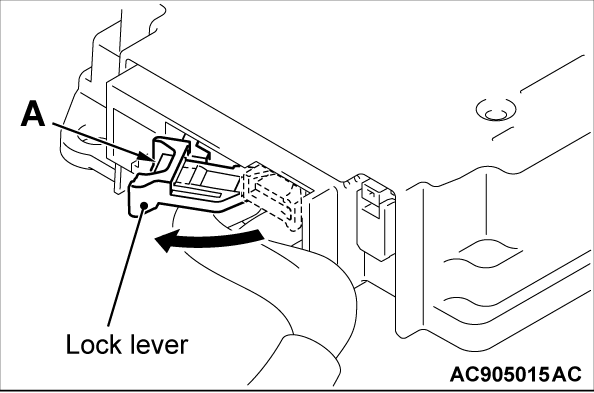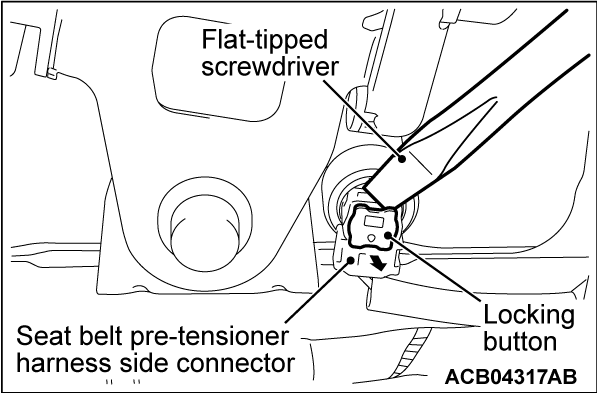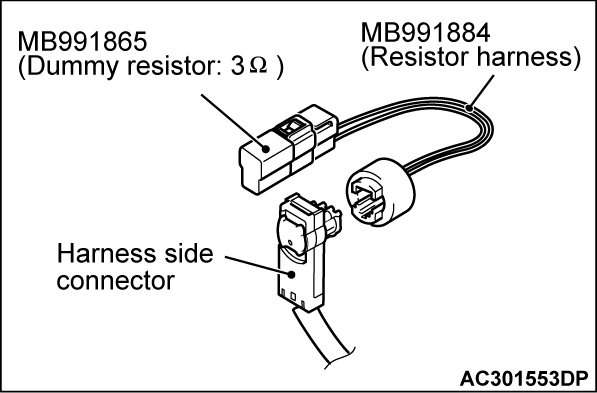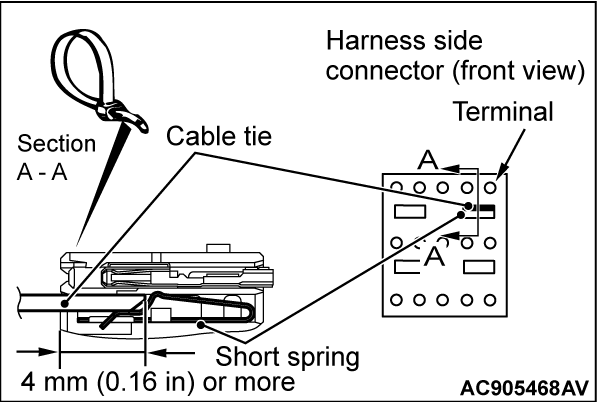DTC B1609: Seat belt pre-tensioner (passenger’s side) (squib) system (short circuit between squib circuit terminals)
| caution | If DTC B1609 is set in the SRS-ECU, always diagnose the CAN main bus line. |
CIRCUIT OPERATION
The SRS-ECU judges how severe a collision is by detecting signals from the front impact sensors and the analog G-sensor in the SRS-ECU. If the impact is over a predetermined level, the SRS-ECU sends an ignition signal. At this time, the pre-tensioner will deploy.
DTC SET CONDITIONS
This DTC is set if there is abnormal resistance between the input terminals of the seat belt pre-tensioner (RH) (squib).
TROUBLESHOOTING HITS
- Improper engaged connector or defective short spring*
- Short circuit between the passenger's seat belt pre-tensioner (squib) circuit terminals
- Damaged connector(s)
- Malfunction of the SRS-ECU
DIAGNOSIS
STEP 1. Using scan tool MB991958, diagnose the CAN bus line.
(1)
| caution | To prevent damage to scan tool MB991958, always turn the ignition switch to the "LOCK" (OFF) position before connecting or disconnecting scan tool MB991958. |
(2) Turn the ignition switch to the "ON" position.
(3) Diagnose the CAN bus line.
(4) Turn the ignition switch to the "LOCK" (OFF) position.
Is the CAN bus line found to be normal?
STEP 2. Recheck for diagnostic trouble code.
Check again if the DTC is set.
(1) Erase the DTC.
(2) Turn the ignition switch to the "ON" position.
(3) Check if the DTC is set.
(4) Turn the ignition switch to the "LOCK" (OFF) position.
Is the DTC set?
STEP 3. Connector check: SRS-ECU, seat belt pre-tensioner (passenger's side).
(1) Check that the negative battery terminal is disconnected. If the negative battery terminal is connected, disconnect it.
(2) While pushing the part "A" indicated in the figure of the harness side connector, turn the lock lever to the direction of the arrow to release the lock lever. After disconnecting the SRS-ECU connector, connect it again.
(3) After disconnecting the seat belt pre-tensioner (passenger's side) harness side connector, connect the connector again. For the seat belt pre-tensioner (passenger's side) harness side connector disconnection, use the flat-tipped screwdriver to pull out the harness side connector locking button. After releasing the lock, disconnect the harness side connector.
(4) Connect the negative battery terminal.
(5) After erasing the DTC memory, check the DTC again.
(6) Disconnect the negative battery terminal.
Is DTC B1609 set?
 Replace the connector concerned.
Replace the connector concerned.STEP 4. Diagnosis check by dummy resistor connection.
(1) Check that the negative battery terminal is disconnected. If the negative battery terminal is connected, disconnect it.
(2) Use the flat-tipped screwdriver to pull out the locking button of harness side connector. After releasing the lock, disconnect the seat belt pre-tensioner (passenger's side) harness side connector.
(3) Connect special tool dummy resistor (MB991865) to special tool resistor harness (MB991884).
(4) Connect special tool resistor harness to the seat belt pre-tensioner (passenger's side) harness side connector.
(5) Connect the negative battery terminal.
(6) After erasing the DTC memory, check the DTC again.
(7) Disconnect the negative battery terminal.
Is DTC B1609 set?
STEP 5. Resistance check at the SRS-ECU connector.
(1) Check that the negative battery terminal is disconnected. If the negative battery terminal is connected, disconnect it.
(2) While pushing the part "A" indicated in the figure of the harness side connector, turn the lock lever to the direction of the arrow to release the lock lever, and disconnect the SRS-ECU connector.
(3)
Use the flat-tipped screwdriver to pull out the locking button of harness side connector. After releasing the lock, disconnect the seat belt pre-tensioner (passenger's side) harness side connector.
| danger | To release the SRS-ECU connector short spring in the following operations, disconnect this seat belt pre-tensioner connector, and keep the squib circuit shorted. |
(4)
| caution | The short spring may not be released due to the insufficient insertion. Therefore, insert the insulator for 4 mm (0.16 inch) or more. |
Insert an insulator [3 mm (0.12 inch) wide, 0.5 mm (0.02 inch) thick] such as cable tie between the PTA+, PTA- line, and the short spring, and release the short spring.
(5) Take the measurements below at the SRS-ECU harness side connector.
- Continuity between PTA+, PTA- line
OK: No continuity
Is the check result normal?
 Repair the wiring harness PTA+, PTA- line between the SRS-ECU connector and the seat belt pre-tensioner (passenger's side) connector.
Repair the wiring harness PTA+, PTA- line between the SRS-ECU connector and the seat belt pre-tensioner (passenger's side) connector.STEP 6. Recheck for diagnostic trouble code.
Check again if the DTC is set.
(1) Erase the DTC.
(2) Turn the ignition switch to the "ON" position.
(3) Check if the DTC is set.
(4) Turn the ignition switch to the "LOCK" (OFF) position.
Is DTC B1609 set?
![[Previous]](../../../buttons/fprev.png)
![[Next]](../../../buttons/fnext.png)





